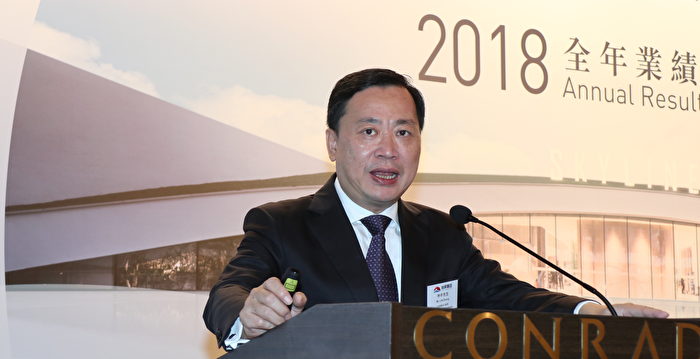[The Epoch Times, November 5, 2022](Comprehensive report by Li Siqi, a reporter from The Epoch Times Special Department) Another private housing company in China exploded. CIFI Holdings Group, which ranks among the top 15 real estate companies in terms of sales performance in the first 10 months, recently announced that due to the deterioration of cash flow, it has suspended the payment of all overseas debts, but will repay domestic debts to “maintain domestic financing”.
In the fourth quarter of 2022, Chinese property developers had total debt maturities of US$53.7 billion, including onshore and offshore bonds and loans, as well as domestic trust loans; Debt maturing for the full year was $238 billion. A Bloomberg report on Nov. 1 published debt statistics for these Chinese property developers.
Although the total debt maturities of Chinese real estate developers in 2023 is about 25% lower than that in 2022, due to the downturn in the Chinese real estate market and the large year-on-year decline in sales performance, the pressure on real estate developers to repay debts remains high.
The China Index Academy (China Index Academy) released the “Sales Performance Rankings of Chinese Real Estate Enterprises from January to October 2022” on October 31. The total corporate sales of the top 100 leading real estate companies in the first ten months of this year was 6,095.46 billion yuan (RMB, the same below, approximately US$8,500 million), down 43.4% year-on-year; the single-month sales in October fell year-on-year 26.5%.
In China’s first 10-month sales performance rankings of real estate companies, CIFI Holdings Group (00884.HK) entered the top 15, with sales of 113.38 billion yuan (about 15.9 billion US dollars), ranking 14th, and the sales area was 7.81 million square meters, ranking 13th. However, on November 1, CIFI Holdings disclosed that it failed to reach any agreement on delayed repayment with all creditors under the overseas debt in October, and had suspended the payment of principal and interest due to all overseas debts— – Debt exploded.
According to the 2022 interim financial report released by CIFI Holdings on September 29, the contracted sales amount in the first half of the year fell by 53.6% year-on-year, net profit fell by 64.5% year-on-year, and net profit attributable to shareholders plummeted by 79.7%.
The announcement of CIFI Holdings stated, “Since September, the market has further deteriorated, sales have been weak, industry financing has become increasingly difficult, and the Group’s cash flow has deteriorated beyond expectations”; Payment pressures have increased sharply in the short term”; even with “best efforts”, “sufficient cash cannot be generated to meet current and future obligations”.
As of November 1, according to statistics from the China Index Research Institute, more than 300 provincial and municipal governments in China have adjusted their policies more than 900 times to stimulate the real estate market. With an average of 90 policy adjustments per month, the “golden nine and silver ten” phenomenon expected by the Chinese real estate market has not appeared. “Golden Nine and Silver Ten” refers to September and October, which are traditional peak sales seasons in China’s housing market.
Xuhui’s debt repayment strategy
As of November 1, CIFI Holdings’ offshore debt (including bank loans, senior notes and convertible bonds) totaled approximately US$6.85 billion, and the total unpaid principal, interest and related additional payments were approximately US$414 million. .
In the announcement, CIFI Holdings stated that it “suspended payments to all overseas creditors”, and at the same time made it clear that it would “make every effort to ensure delivery, operation and domestic financing”.
Chu Hanshi, a senior Chinese financial practitioner living in the UK, told The Epoch Times on November 4: “Judging from the performance of CIFI Holdings this year, it is more cautious in acquiring land, and in the third quarter of this year, it sold a number of projects to raise funds.”
On July 11, CIFI Holdings sold Shanghai CIFI Pure Center Building 6 to Shanghai Lingai for 187 million yuan (about 2,600 US dollars). On August 31, CIFI Holdings raised a total of approximately HK$628 million (approximately US$82 million) through allotment of shares at a discount. On September 6, CIFI Holdings announced that it would sell its Hong Kong property to Huawang Co., Ltd. for a transaction consideration of HK$1.338 billion (approximately US$170 million). On September 9, the three Lin brothers, the controlling shareholder of CIFI, continued to move assets, and transferred part of the equity of the Nanjing leasing project from CIFI Holdings to the long-term rental apartment Lingyu, with a return of 117 million yuan (about 16 million US dollars).
Chu Hanshi believes that CIFI Holdings is “rich”, “but it must first support its domestic business, because its business is in China, so it also says that domestic debts are repaid on schedule”, “because there is no way to Borrowing new debts to pay off old debts is no longer possible at home and abroad, so I completely gave up on overseas debts.”
As a private real estate company once favored by the outside world, CIFI Holdings received a credit enhancement from China Bond Credit Enhancement Corporation in August, and is currently participating in the second round of domestic credit enhancement and bond issuance projects. China Securities Journal, the official media of the Communist Party of China, reported on November 3 that industry insiders bluntly stated that the biggest concern of bond lead underwriters in underwriting bonds of private real estate companies is “not being able to sell.”
Responsible editor: Lian Shuhua#
